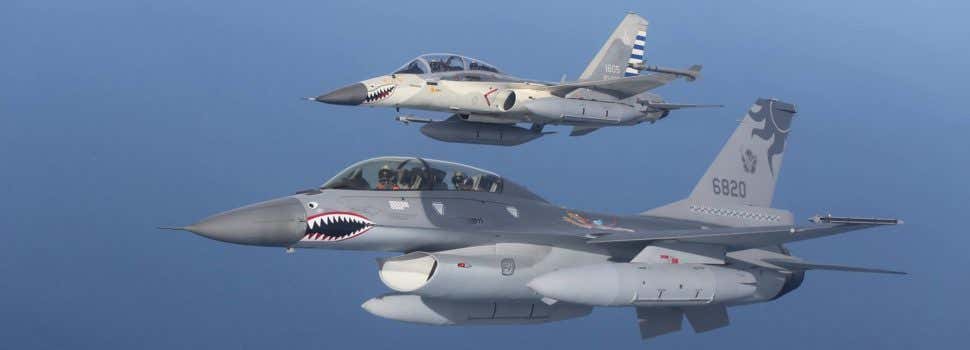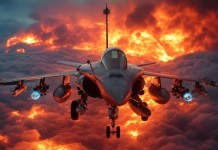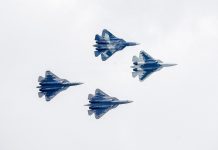Taiwan will not start a war with China but will defend itself if Beijing takes hostile actions against it first, Taiwanese Defense Minister Chiu Kuo-cheng said on Thursday.
Gripen Fighter Jet Maker SAAB Bets Big On Ternav System To Thwart EW Attacks Including GPS Jamming
F-15 Strike Eagle Jet Demonstrates Capability To ‘Wipe Out’ Terror Facilities With ‘Heavy-Duty’ GBU-72 5K Penetrator Bomb
Last week, the minister said that mainland China may consider mounting a full-scale invasion of the island by 2025. The statement came after Beijing sent nearly 150 military aircraft into Taiwan’s air defense zone since October 1.
“The Republic of China [Taiwan] will definitely not start a war [against mainland China] but if the other side starts to act, they will have to take a fight,” Chiu was quoted as saying in the parliament by the Central News Agency.
Any actions by Taiwan may be used as a pretext for mainland China to launch hostilities, so Taipei will restrain itself from provoking a conflict or start a war, the minister noted.

Commenting on the drills near the border with Taiwan, China’s Taiwan Affairs Office said earlier this week that Beijing’s military exercises are aimed at guarding its national sovereignty and preventing foreign interference in the relations between the mainland and the island.
Taiwan has been governed independently from mainland China since 1949. Beijing views the island as its province, while Taiwan — a territory with its own democratically elected government — maintains that it is an autonomous country and has political and economic relations with several other nations that recognize its sovereignty.
It was never uncommon for Chinese warplanes to fly over Taiwan’s defense zone but recently China went a step further by sending in a record number of its aircraft into the Taiwanese airspace, creating unease in the region.
Straight From Science Fiction, US To Equip Its Military With High-Energy Laser Guns For Next-Gen Warfare
Japanese Version Of F-16 Fighter Aircraft Loses Its Cockpit Canopy Mid-Air While Chasing An Intruding Jet
The latest Chinese mission included 34 J-16 fighter jeTs and 12 nuclear-capable H-6 bombers that flew in an area near the Pratas Islands. Many defense experts opine that this incursion was China’s way of warning against Taiwan’s formal independence declaration and deepening Washington-Taipei ties.
Origins Of The Taiwan-China Divide
Taiwan, officially the Republic of China (ROC), calls itself a sovereign, democratic state with its formation in 1949 when ROC lost mainland China to the Chinese Communist Party (CCP) during the civil war. The People’s Republic of China (PRC) is ruled by the communist party with Xi Jinping as the current head.

The PRC has since the beginning maintained that Taiwan was nothing but a breakaway province of China whereas Taipei has insisted it was an independent state that has its own constitution, democratically elected leaders, currency, passport, and armed forces.
Till 1971, the island was having a seat in the United Nations until PRC was voted to be recognized. Currently, Taiwan only has diplomatic relations with 14 out of 193 UN member states and the Holy See, the universal government of the Catholic Church and operates from Vatican City State, an independent territory.
China’s Increasing Aggression
China has always denied Taiwan’s independence and has repeatedly called for ‘peaceful reunification’ and ‘One China Policy.’ Also known as the 1992 consensus, the One-China policy asserts the existence of a singular Chinese state including Taiwan.
The currently deteriorating ties are considered as the worst in the last 40 years with Xi Jinping recently declaring a peaceful reunification soon. Contrary to the word ‘peaceful,’ it is said that China is prepared to use force if necessary.
Taiwanese officials have repetitively raised their concerns on the increased breaching of their air defense by the Chinese warplanes and the high probability of it leading to a military accident.
As F-35 Goes Nuclear, Is Lockheed Martin On Course To Arm US’ Stealth Jets With Hypersonic Missiles?
As India Opens Up Space, How ISRO Could Help Indian Air Force Become An Aerospace Superpower?
The US supports PRC’s One-China policy and has no diplomatic ties with Taiwan. Instead, the US-Taiwan ties hinge on the Taiwan Relations Act that includes providing the latter with arms for its defense and maintain peace and stability in the Western Pacific.
Neil Thomas, an analyst of the Eurasia Group, says, “There’s increasing recognition in Washington that it needs to invest more military, diplomatic and economic resources to deter Beijing from taking any actions to change Taiwan’s “de facto autonomy. And we’ve seen the Biden administration take up where the Trump administration left off when it comes to Taiwan policy.”

This unwavering support of the US towards Taiwan caused Beijing to intervene. Last week, at an event marking the 110th anniversary of the revolution that overthrew China’s last imperial dynasty in 1911, Xi Jinping stated that unification in a “peaceful manner” was “most in line with the overall interest of the Chinese nation, including Taiwan compatriots.”
Straight From Science Fiction, US To Equip Its Military With High-Energy Laser Guns For Next-Gen Warfare
Xi also talked about Chinese people’s glorious tradition of standing against ‘separatism’. Tsai Ing-Wen is currently in her second and final four-year presidential term with a majority of votes in her favor. And although a pragmatic leader who came to power promising to stand against Chinese aggressions, China has constantly called her a separatist looking to ‘formally declare’ independence.
“Beijing consistently has not trusted Tsai Ing-wen even though she’s been a truly pragmatic president — they’ve called her a closet independence supporter, a separatist,” Derek Grossman, a senior defense analyst at Rand Corporation stated.
Taiwan’s Response & Preparation
Speaking at Taiwan’s National Day celebrations in Taipei, Tsai struck down Jinping’s comments saying that Taiwan stood on democracy’s first line of defense and that Taipei would not act rashly but would bolster its defenses to ensure that nobody can force Taiwan to take the path China has laid out for them.

She remarked that the path that China plans for them under ‘One China, Two System’ is “neither a free and democratic way of life for Taiwan nor sovereignty” for its 23 million people.
F-35 Stealth Jets Plagued By Engine Issues; Will USAF Dump ‘Low Yield’ Pratt & Whitney Engines For GE’s XA100?
Chiu Kuo-cheng, Taiwan’s defense minister, warned that China would be capable of mounting a full-scale invasion of the island by 2025. While speaking as a parliamentary committee he acknowledged that China already has the capacity to invade with this capability increasing over the next few years.
Former national security advisor, Gen. (ret.) H.R. McMaster said in an interview that “We are in a very dangerous period where the Chinese party thinks it has a fleeting window of opportunity to realize the annexation of Taiwan as a part of its campaign of national rejuvenation which of course is tied back to the party’s obsession with its exclusive grip on power and its fear of losing control.”
On the other hand, Taiwanese Foreign Minister Joseph Wu said in an interview with ABC, “I’m sure that if China is going to launch an attack against Taiwan, I think they are going to suffer tremendously as well.”
While Taiwan has assured of no first confrontation but complete retaliation when the situation demands it, the world and especially the United States have their breaths hitched and eyes glued on the China-Taiwan relations and how it pans out when a new president is elected in Taipei in 2024.
- With Inputs from Sputnik News Agency
- Contact the author at Nytten@gmail.com
- Follow EurAsian Times on Google News




